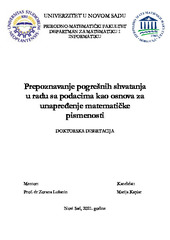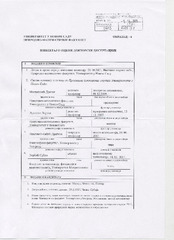Приказ основних података о дисертацији
Prepoznavanje pogrešnih shvatanja u radu sa podacima kao osnova za unapređenje matematičke pismenosti
Recognizing misconceptions in working with data as a basis to enhance mathematical literacy
| dc.contributor.advisor | Lužanin, Zorana | |
| dc.contributor.other | Mašulović, Dragan | |
| dc.contributor.other | Lužanin, Zorana | |
| dc.contributor.other | Pavlović Babić, Dragica | |
| dc.contributor.other | Verbić, Srđan | |
| dc.creator | Каплар, Марија | |
| dc.date.accessioned | 2022-02-23T19:24:00Z | |
| dc.date.available | 2022-02-23T19:24:00Z | |
| dc.date.issued | 2022-02-12 | |
| dc.identifier.uri | https://www.cris.uns.ac.rs/DownloadFileServlet/Disertacija163576459845439.pdf?controlNumber=(BISIS)118389&fileName=163576459845439.pdf&id=18767&source=NaRDuS&language=sr | sr |
| dc.identifier.uri | https://www.cris.uns.ac.rs/record.jsf?recordId=118389&source=NaRDuS&language=sr | sr |
| dc.identifier.uri | https://www.cris.uns.ac.rs/DownloadFileServlet/IzvestajKomisije163644969222493.pdf?controlNumber=(BISIS)118389&fileName=163644969222493.pdf&id=18839&source=NaRDuS&language=sr | sr |
| dc.identifier.uri | https://nardus.mpn.gov.rs/handle/123456789/18963 | |
| dc.description.abstract | Kritičko rezonovanje, rad sa podacima, i donošenje odluka u neizvesnim situacijama predstavljaju važne kompetencije u ličnom i profesionalnom radu pojedinca pa su u skladu sa tim takva znanja i veštine prepoznati kao važne kompetencije matematičke pismenosti. Pored opšte potrebe za matematičkom pismenošću kada su u pitanju neizvesnost i podaci, dinamično okruženje u kojem inženjeri svakodnevno rade je zahtevno i neprekidno donosi nove izazove u vidu mnogih raznolikih i neprestanih promena koje zahtevaju mnoštvo stručnih kompetencija i netehničkih znanja i veština kao što su donošenje odluka u neizvesnim situacijama, kritičko rezonovanje i veštine rada sa podacima. S obzirom da nema straživanja koja se bave ispitivanjem rezonovanja studenata tehničkih fakulteta iz Srbije kada su u pitanju određeni koncepti iz verovatnoće, statistike i rad sa podacima, ova studija ima za cilj da prikaže uvid u trenutno stanje i ukaže na potrebu za unapređenjem obrazovanja u ovoj oblasti. Cilj ove studije nije da izmeri „školsko“ znanje studenta iz verovatnoće i statistike već da ispita rezonovanje i proceni postignuća studenata prilikom rešavanja zadataka koji su pokazatelji različitih tipova miskoncepcija zasnovanih na nedovoljnom poznavanju, razumevanju ili primeni osnovnih koncepata iz verovatnoće, statistike i rada sa podacima. Istraživanje prikazano u ovoj tezi sprovedeno je u tri dela. Cilj prvog dela istraživanja je da se ispita u kojoj meri su studenti tehničkih fakulteta iz područja rada elektrotehnike podložni sledećim tipovima miskoncepcija: zanemarivanju veličine uzorka, zanemarivanju osnovnog skupa, miskoncepciji šansi, iluzornoj korelacija i miskoncepcijama vezanim za evaluaciju verovatnoće konjunktivnih i disjunktivnih događaja. S obzirom da su studenti koji učestvuju u ovoj studiji završili formalno douniverzitetsko obrazovanje, ova studija će pokazati i ima li razlike u uspešnosti studenata u prevazilaženju miskoncepcija između studenata koji su imali nastavu i onih koji to nisu iz oblasti verovatnoće i statistike tokom formalnog obrazovanja.Poseban osvrt napravljen je na vezu između studentskih obrazloženja odgovora i njihovog skora na testu koji ispituje prisustvo pomenutih miskoncepcija. Za analizu studentskih postignuća kao i za ispitivanje veze obrazloženja odgovora i skora na testu primenjena je Rašova analiza. U drugom delu studije ispitani su stavovi studenta o proceni sopstvenog znanju iz matematike i statistike, o značaju i upotrebi statistike i matematike u ličnom i budućem profesionalnom životu kao i o zloupotrebi podataka. U ovom delu istraživanja ispitana je i veza studentskih postignuća i datih stavova. U trećem delu ove studije istraženi su sadržaji programa nastave i učenja formalnog douniverzitetskog obrazovanja sa ciljem da da se ispita usklađenost propisanih ishoda, obrazovnih standarda i opštih i specifičnih predmetnih i međupredmetnih kompetencija za nastavni predmet Matematika. Takođe u ovoj fazi istražena su postignuća učenika iz Srbije vezana za rad sa podacima na završnom ispitu, TIMSS i PISA istraživanju. | sr |
| dc.description.abstract | Critical reasoning, working with data, and decision-making in uncertain situations represent important competencies in one's personal and professional work. In accordance with that, such skills and knowledge have been recognized as important competencies of mathematical literacy. Apart from the generalneed for mathematical literacy in terms of uncertainty and data, the dynamic surroundings in which engineers work day-to-day is very demanding and constantly brings new challenges, such as various relentless changes which require specialist competencies and non-technical skills and knowledge, e.g., decision making in uncertain situations, critical thinking, and skills for working with data. Considering there is no research that examines the reasoning of Serbian students of technical faculties related to particular concepts from probability, statistics, and working with data, this study aims at representing the current state and pointing out the need for the improvement of education in this area. This study doesn’t aim at measuring students' “school” knowledge of probability and statistics; its purpose is rather to investigate students' reasoning and to evaluate students’ achievements while solving the assignments prone to different types of misconceptions based on insufficient familiarity, understanding or implementation of basic concepts from probability, statistics and working with data.The research explained in this thesis has been conducted into three parts. The goal of the first part of the research is to test the extent to which the students of technical faculties are prone to the following types of misconceptions: insensitivity to sample size, base rate neglected, misconceptions of chance, illusory correlation, and biases in the evaluation of conjunctive and disjunctive events. Considering that the participants of this study are students who finished their formal pre-university education, this study is also going to show whether there is any difference in the efficiency to overcome misconceptionsbetween the students who have and have not attended courses in probability and statistics during their formal education. A special emphasis has been put on the connection between the students' laborations on answers and their test scores which examines the presence of the mentioned misconceptions. To analyze students’ achievements and examine the connection between their elaborations on answers and test scores, Rasch analysis was implemented. The second part of the studyexamines the students’ attitudes on the evaluation of their own mathematical and statistics knowledge, significance and use of statistics and mathematics in personal and future professional life, and data misuse. This part of the research also examines the connection between the students’ achievements and expressed attitudes. The third part of the study researches formal preuniversity education, with the aim to test the compatibility of regulated outcomes, educational standards, and general and specific disciplinary and interdisciplinary competencies in the school subject mathematics, which is related to the concept of probability, statistics, and working with data. Furthermore, this phase researches the accomplishments of Serbian students related to working with data on their final exam, TIMSS, andPISA research. | en |
| dc.language | sr (latin script) | |
| dc.publisher | Универзитет у Новом Саду, Природно-математички факултет | sr |
| dc.rights | openAccess | en |
| dc.rights.uri | https://creativecommons.org/licenses/by-nc/4.0/ | |
| dc.source | Универзитет у Новом Саду | sr |
| dc.subject | Prepoznavanje miskoncepcija | sr |
| dc.subject | Recognition of misconceptions | en |
| dc.subject | students’ attitudes | en |
| dc.subject | explanations of answers | en |
| dc.subject | work with data | en |
| dc.subject | teaching probability and statistics | en |
| dc.subject | stavovi studenata | sr |
| dc.subject | obrazloženja odgovora | sr |
| dc.subject | rad sa podacima | sr |
| dc.subject | nastava verovatnoće i statistike | sr |
| dc.title | Prepoznavanje pogrešnih shvatanja u radu sa podacima kao osnova za unapređenje matematičke pismenosti | sr |
| dc.title.alternative | Recognizing misconceptions in working with data as a basis to enhance mathematical literacy | en |
| dc.type | doctoralThesis | sr |
| dc.rights.license | BY-NC | |
| dcterms.abstract | Лужанин, Зорана; Вербић, Срђан; Машуловић, Драган; Лужанин, Зорана; Павловић, Бабић, Драгица; Kaplar, Marija; Препознавање погрешних схватања у раду са подацима као основа за унапређење математичке писмености; Препознавање погрешних схватања у раду са подацима као основа за унапређење математичке писмености; | |
| dc.identifier.fulltext | http://nardus.mpn.gov.rs/bitstream/id/142258/Disertacija_12112.pdf | |
| dc.identifier.fulltext | http://nardus.mpn.gov.rs/bitstream/id/142259/Izvestaj_komisije_12112.pdf | |
| dc.identifier.rcub | https://hdl.handle.net/21.15107/rcub_nardus_18963 |



